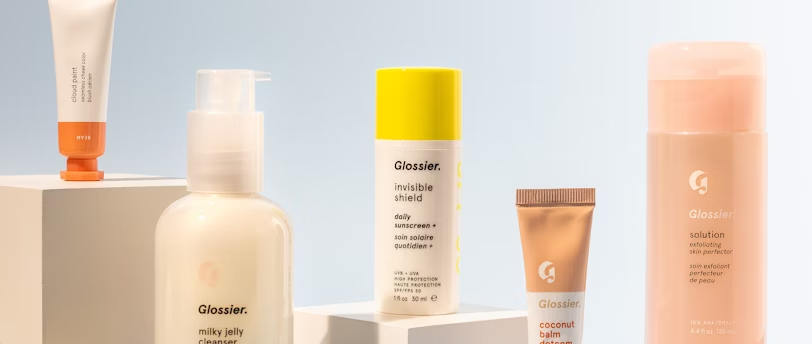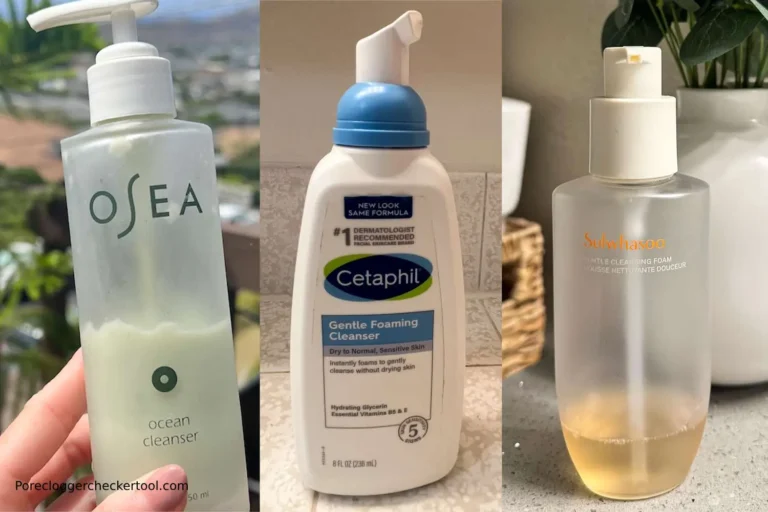What is Non-Comedogenic?
The term “non-comedogenic” refers to skincare and cosmetic products formulated specifically to minimize the likelihood of clogged pores. When pores become clogged, it often leads to acne breakouts and other skin issues, particularly for individuals with oily or acne-prone skin. Non-comedogenic products are designed with this concern in mind, incorporating ingredients that do not contribute to pore blockage, making them a prudent choice in managing skin health.
Understanding what constitutes a non-comedogenic product involves recognizing the role of various ingredients. Many common skincare and makeup products contain oils, silicones, and waxes, which can potentially lead to pore obstruction. Non-comedogenic formulations, however, typically employ lightweight, breathable ingredients that slide easily over the skin without causing build-up in the pores. For individuals prone to acne, selecting non-comedogenic products can be an essential part of an effective skincare regimen.
The significance of ingredient selection cannot be overstated when considering non-comedogenic options. Many brands specifically label their products as non-comedogenic, providing consumers with assurance that those formulations have been rigorously tested to ensure they will not contribute to skin issues. Furthermore, non-comedogenic products often contain beneficial components such as antioxidants, anti-inflammatory agents, and hydrating substances that promote skin health without the risk of clogging pores.
Ultimately, choosing non-comedogenic products is crucial for individuals seeking to maintain clear, healthy skin, particularly those with oily or acne-prone skin types. By opting for these specially formulated products, consumers can minimize adverse effects while enjoying the benefits of skincare and makeup without compromising their skin’s integrity.
Related Posts:
- Best Non-Comedogenic Shampoos for Acne-Prone and Sensitive Skin
- Non-Comedogenic Cleaners: Best Picks for Clear Skin
- Best Non-Comedogenic Foundations for Acne-Prone and Oily Skin
The Importance of Non-Comedogenic Products
Non-comedogenic products play a vital role in maintaining skin health, especially for individuals prone to acne or other skin conditions. These formulations are specifically designed to avoid clogging pores, which can lead to breakouts and exacerbate existing skin issues. The primary benefit of using non-comedogenic products lies in their ability to minimize the risk of acne development. By allowing the skin to breathe and preventing pores from becoming blocked with excess oil and impurities, these products can significantly reduce the occurrence of blemishes and promote a smoother complexion.
For those with oily or acne-prone skin, utilizing non-comedogenic formulations is essential. Such products typically feature lightweight textures that do not leave a heavy residue, thereby reducing the likelihood of breakouts. In contrast, many conventional cosmetics and skincare items contain ingredients that can increase oil production or trap dirt and bacteria, which can further provoke an inflammatory response. By opting for non-comedogenic alternatives, individuals are better equipped to manage their skin’s oil levels and overall health.
Additionally, non-comedogenic products are beneficial for other types of sensitive skin, including those prone to irritation and redness. Ingredients in regular formulations can sometimes trigger adverse reactions, leading to discomfort and inflammation. Non-comedogenic options often contain gentler, hypoallergenic ingredients that are less likely to cause these adverse effects. This makes them suitable for a wider range of skin types, ensuring that everyone can find a formulation that works for their needs.
In conclusion, choosing non-comedogenic products is crucial for anyone looking to maintain clear and healthy skin. By reducing the risk of breakouts and sensitivity, these carefully crafted formulations contribute to overall skin wellness, allowing individuals to feel confident in their appearance.
Common Ingredients in Non-Comedogenic Products
Understanding which ingredients contribute to non-comedogenic products is vital for individuals seeking to maintain clear skin, particularly those prone to acne or breakouts. Non-comedogenic formulations typically avoid specific substances known to clog pores and promote the development of blemishes. For example, heavy oils such as mineral oil and certain silicones are commonly excluded, as they can create a barrier that traps dirt and oil in the pores.
Instead, many non-comedogenic products embrace lighter oils and extracts that are less likely to cause acne. Ingredients such as jojoba oil, squalane, and argan oil are examples of non-comedogenic alternatives that provide hydration without contributing to pore blockage. These ingredients mimic the skin’s natural oils, allowing for moisture retention while maintaining a non-greasy feel.
Another category to consider is emulsifiers and surfactants. Non-comedogenic formulas often use non-irritating and gentle surfactants, such as decyl glucoside and sodium cocoyl Isethionate, enhancing cleansing properties while minimizing the risk of clogging pores. Additionally, mineral-based components like zinc oxide and titanium dioxide are favored, as they offer sun protection without aggravating sensitive or acne-prone skin.
When scrutinizing labels, it is also beneficial to consider the presence of botanical extracts, which often contribute to both anti-inflammatory and soothing effects on the skin. Aloe vera, chamomile, and green tea are valued for their properties that can calm irritation and promote a healthy complexion. While not all products labeled as non-comedogenic are created equal, being informed about these common ingredients can empower consumers to make better choices for their skincare and makeup routines.
How to Identify Non-Comedogenic Products
Navigating the world of skincare products can be overwhelming, particularly when seeking formulations that are non-comedogenic. Understanding how to identify non-comedogenic products is crucial for individuals prone to acne or those with sensitive skin. The first step in this process is to read product labels carefully. Look for ingredients specifically labeled as non-comedogenic, as this indicates that the formulation has been designed to avoid clogging pores.
In addition to checking the label, consumers should be aware of common terms or certifications that signify skin-friendly formulations. Products marked as “oil-free,” “non-acnegenic,” or “non-greasy” are generally considered suitable for acne-prone skin. It is advisable to familiarize oneself with helpful terminology, which can indicate a brand’s commitment to producing non-comedogenic items. This knowledge will empower consumers to make informed choices while shopping.
Researching brands also plays a key role in identifying non-comedogenic products. Many reputable skincare brands prioritize skin health and transparently list whether their products are non-comedogenic. Online reviews, consumer reports, and brand websites can provide insights into the effectiveness and suitability of their products for various skin types. Engaging with online communities or forums may also be beneficial, as shared experiences from other consumers can guide one’s selections.
An equally important aspect of ensuring that skincare products align with individual needs is conducting patch tests. Applying a small amount of a new product to an inconspicuous area of the skin can help identify potential adverse reactions without risking the face or larger skin areas. By following these practical tips, one can make smarter, evidence-based purchasing decisions and maintain a clearer complexion.
Myths and Misconceptions About Non-Comedogenic Products
When it comes to skincare, understanding the terminology is crucial for making informed choices. Non-comedogenic products are often touted as the best option for individuals concerned about breakouts, yet several myths persist about what this term truly means. One prevalent misconception is that all natural products are inherently non-comedogenic. While many natural ingredients can be beneficial for the skin, some may still clog pores, particularly if they are high in saturated fats or oils. Therefore, it is essential to scrutinize the full ingredient list of any product, whether it is derived from natural sources or synthetic formulations.
Another common belief is that non-comedogenic products are always gentle and will never irritate the skin. This assumption could not be further from the truth. Non-comedogenic does not equate to hypoallergenic or irritation-free; rather, it refers to the product’s formulation and its likelihood to block pores. Some individuals may still experience reactions due to specific ingredients, even in products labeled as non-comedogenic. People with sensitive skin should proceed with caution and consider patch testing new products prior to full application.
Moreover, the term “non-comedogenic” is not regulated by any governing body, meaning that different brands may have varying standards for what they consider non-comedogenic. As a result, a product that works well for one person may not have the same effect for another. It is advantageous for consumers to understand that skincare is highly individualistic. Consequently, examining various formulations, considering skin types, and identifying personal triggers is vital in selecting truly suitable products.
By dispelling these myths and misconceptions, individuals can better navigate the complex landscape of skincare labels and product claims, ultimately leading to more informed and effective choices in their skincare routines.
Recommendations for Non-Comedogenic Products
Choosing non-comedogenic skincare and makeup products is essential for maintaining a clear complexion, especially for those with acne-prone or sensitive skin. Below is a curated list of popular and effective non-comedogenic products categorized by type to assist you in making informed decisions.
Moisturizers
One recommended non-comedogenic moisturizer is Neutrogena Hydro Boost Water Gel. This lightweight formula hydrates the skin without clogging pores, thanks to its oil-free composition and inclusion of hyaluronic acid, which helps retain moisture. Another excellent option is the La Roche-Posay Toleriane Double Repair Face Moisturizer, known for its soothing properties that cater well to sensitive skin types while maintaining non-comedogenic standards.
Foundations
For makeup enthusiasts, choosing a foundation that is non-comedogenic is crucial. The Fenty Beauty Pro Filt’r Soft Matte Longwear Foundation offers an oil-free formula that provides full coverage without causing breakouts. Another great choice is the Maybelline Fit Me Matte + Poreless Foundation. This product works well for normal to oily skin, delivering a smooth finish while ensuring that pores remain unclogged.
Sunscreens
When it comes to sun protection, look for non-comedogenic options such as EltaMD UV Clear Broad-Spectrum SPF 46. This mineral sunscreen is specifically designed for acne-prone skin and provides a lightweight feel without the risk of breakouts. Additionally, the Neutrogena Ultra Sheer Dry-Touch Sunscreen SPF 100 is another excellent non-comedogenic choice, offering high SPF protection while remaining breathable on the skin.
These selections have been recognized for their non-comedogenic formulations, ensuring users can enjoy hydrated, protected, and clear skin without unwanted breakouts. By incorporating these products into your routine, you can help maintain skin clarity and overall health.
Conclusion: Making the Right Choices for Your Skin
Choosing the right skincare products is essential for maintaining a healthy complexion, particularly for individuals susceptible to acne or other skin irritations. Throughout this blog post, we have explored the significance of non-comedogenic products, defined as formulations that do not clog pores. Understanding this concept is vital, as using non-comedogenic alternatives can significantly reduce the likelihood of breakouts and promote clearer skin.
It is crucial to recognize that everyone’s skin is unique, with varying sensitivities and preferences. As such, what works for one person may not be suitable for another. The array of products labeled as non-comedogenic offers a range of options, from moisturizers and serums to makeup items. However, it is imperative to scrutinize ingredient lists and pay attention to how your skin reacts to various formulas. Ingredients that may be safe for some could cause irritation for others, making personal assessment a key component of effective skincare.
Moreover, while selecting non-comedogenic products is a positive step, it is equally important to incorporate a consistent skincare routine that aligns with your specific skin type and concerns. Factors such as environmental stressors, hormonal changes, and diet can impact your skin’s health, necessitating adaptability in your choices. By being diligent and informed, individuals can navigate the complex landscape of skincare to find products that not only enhance their appearance but also bolster skin health.
Ultimately, the journey toward healthier skin involves awareness of ingredients and their effects, especially for those prone to breakouts. By prioritizing non-comedogenic options, readers can make empowered decisions that cater to their unique skin needs, leading to a happier and more confident self.



